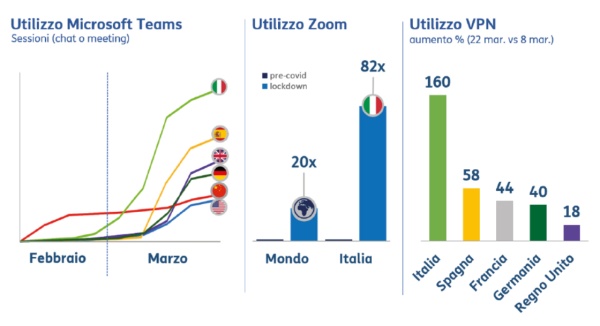Websoft giants are doing great
Do you know HOW great?
We already knew that “Big Tech” was making even more money than usual thanks to the pandemic, but how much, and with which impacts? Some of the many answers to these questions became a bit easier to find yesterday, when the italianfinancial analysis and research center of MedioBanca published a report about the resilience of “websoft” giants during the pandemic.

Websoft stands for “Web and software”, and the giants would be the 25 companies operating in that sector, that declared revenues over 8.5B Euros in 2019 (that is the dotted line in the figure above). The reports analizes the performances of the “giants” from 2015 to 2019, or the first half of 2020, and it does not include Apple (probably because it is a bank, posing as hardware maker). Here are some of the factoids of the report that may, no: should be of more general interest.
Money! Lots of money
- in 2019, those 25 websoft giants gained 146B Euros
- 14 of them are based in the USA (Delaware, except Microsoft), 6 in China (with legal seat in the Caymans), 3 in Japan and 2 in Germany
- Free markets are less and less free, and less and less markets too: in 2019, the first three giants got about half the total revenues of the sector, and the gap in revenues between the first five and the last five doubled from 2015 to 2019
- the websoft giants grew over ten times faster than manufacturing industries in 2015/2019
Good. That’s also a lot of tax revenues, right?
Not really. Quite less than it should be, in any case: “about half of pre-tax revenues of the websoft giants is taxed in “reduced fiscality countries”, with total savings in the 2015-2019 period of more than 46B Euros: Microsoft, Alphabet and Facebook saved respectively 14.2B. 11.6B and 7.5B Euros”.
The report also mentions that the italian subsidiaries of the same giants paid to the italian revenue service almost 70M Euros in 2019, corresponding to an actual tax rate of 32.1%.
But it still means lots of JOBS, right?
Again, not really:
- Employment by the giants grew between 2015 and 2019 of one million units, that is a 90% increase. In the same years, employment by manufacturing multinationals only grew 3.8%. However, a great part of this “growth” consists of acquisitions of other companies, NOT of new, additional jobs
- Besides, websoft giants need much less people to make the same money. To make ten millions of Euros in revenues, retail colosses like Amazon or JD.com only need 32 or 31 employees, Alibaba 18 and eBay 14. In comparison, to make the same revenues the big names of food distribution must employ, on average, 51 people
Cloud computing to rule them all. Especially in Italy
Another “interesting” news in the report, for Italy at least, is how much the pandemic increased the dependency on foreign single points of failure, er, I meant: providers of digital services:

“Cloud adoption is mainstream and we expect a strong acceleration in upcoming months, as a consequence of the Covid-19 pandemic and when considering adoption in Italy stands at 9% (vs European average at 18%)."
Who writes this, why, and how to help
I am Marco Fioretti, tech writer and aspiring polymath doing human-digital research and popularization.
I do it because YOUR civil rights and the quality of YOUR life depend every year more on how software is used AROUND you.
To this end, I have already shared more than a million words on this blog, without any paywall or user tracking, and am sharing the next million through a newsletter, also without any paywall.
The more direct support I get, the more I can continue to inform for free parents, teachers, decision makers, and everybody else who should know more stuff like this. You can support me with paid subscriptions to my newsletter, donations via PayPal (mfioretti@nexaima.net) or LiberaPay, or in any of the other ways listed here.THANKS for your support!